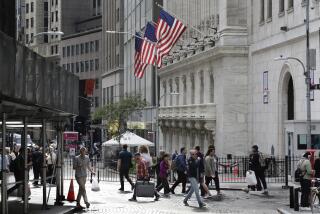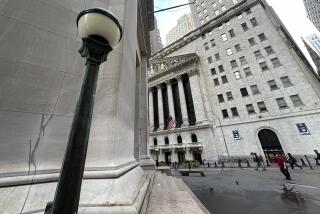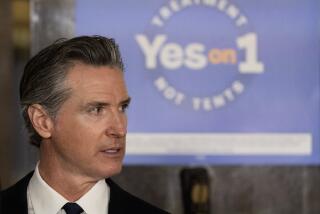Oil Prices Shoot Up $1 a Barrel : Energy: The rise comes after OPEC announced production cuts. The increase hurt stock and bond prices.
- Share via
Oil prices soared more than $1 a barrel to a six-month high Tuesday, depressing stock and bond prices as investors worried about the price rise’s effect on the nation’s economic recovery.
The higher prices came on the first day of trading after OPEC’s decision last week to try to force higher world oil prices by restraining third-quarter production.
For consumers, the higher prices could translate into relatively modest price hikes of 6 to 8 cents a gallon at the gasoline pump. Even so, analysts worried that higher gas prices could hurt the economy by boosting the inflation rate and widening the trade deficit.
The stock market jitters came amid speculation that OPEC’s decision could create third-quarter crude oil shortages and reports that oil giant Saudi Arabia had shifted from its policy of supporting moderate prices to a more bullish posture.
By the end of the day, however, many energy analysts were discounting those notions.
“I honestly don’t believe that there’s a high probability of a shortage. . . . The problem has been that there has been too much oil,” said Bruce Pasternack, managing officer of the energy practice and senior vice president at Booz, Allen & Hamilton in San Francisco.
As the impact of last week’s Vienna meeting of the Organization of Petroleum Exporting Countries became clearer, some energy experts expressed skepticism that Saudi Arabia had radically changed its post-Gulf War policy of supporting moderate prices.
Some analysts said OPEC’s move Friday was primarily meant as a warning against European proposals to tack on a “carbon tax” to imported oil. The European Community, apparently taking encouragement from the Bush Administration’s recent compromises on international environmental goals, has proposed a consumption-dampening $3-a-barrel tax on fossil fuels, blamed for global warming.
The OPEC nations say the tax would deprive oil-producing nations of revenue, even as they have kept production high and oil prices low for the world’s consumers.
“Once they achieve their purpose of killing this effort, I think they will go back to their policy of price moderation,” said Vahan Zanoyan, senior director of Washington-based Petroleum Finance Co., an international energy consulting company.
Indeed, Saudi King Faud told the Associated Press in Riyadh that the kingdom remained committed to “a balanced petroleum policy that aims at stability of the oil market,” though he also seemed to accept moderately higher prices this year.
Saudi Arabian policy has been to keep production levels near capacity and oil prices relatively low and stable.
“Saudi Arabia has for a long time tried to maintain some price moderation, partly because they want oil to remain a commercially viable fuel in the very long term,” Zanoyan noted. “They do not want alternative fuels to become competitive in the market.”
Light, sweet crude oil for delivery in July was $22 per barrel Tuesday, up $1.06, on the New York Mercantile Exchange. Unleaded gasoline for delivery in June settled at 66.27 cents a gallon, up 2.33 cents.
OPEC decided Friday against lifting by another million barrels its current production ceiling of about 23 million barrels a day. Saudi Arabia had been expected to force the higher ceiling, while Iran and most other OPEC nations held out for the lower production limit, to force depressed oil prices higher.
But Saudi Arabia surprised the meeting by almost passively agreeing to continued lower limits.
Oil brokers apparently reacted to an article in Tuesday’s Wall Street Journal that said the Saudi move signaled a shift from its moderate pricing policies. Predictions were widespread that this could raise oil prices by as much as $3 a barrel by the end of 1992.
“A number of people think this has gotten a bit inflated, and that there will be a (price) retreat once that realization sets in,” said William L. Liscom, publisher of New York-based OPEC Listener, an industry analysis service. Liscom, who attended the OPEC meeting, believes that Saudi Arabia got basically what it wanted without any policy shift or confrontations.
“What has moved prices today, supposedly, is the idea that Saudi Arabia has moved its policy on prices, and that explains its passive nature at the meeting,” Liscom said. “But that is not substantiated.”
Big Turn for Energy Prices? The price of oil rocketed $1.06 to $22 a barrel Tuesday in New York-highest in six months-on reports that Saudi Arabia now favors higher prices. Experts say the Saudi posture could assure rising prices for energy as the world economy recovers. Even excluding the 1990price spike caused by Iraq’s invasion of Kuwait, oil has been in a steady upward trend since 1988. Monthly average prices (except latest), West Texas intermediate crude, per barrel Tuesday close, $22 Source: Platt’s Oil Price Handbook
Natural Gas Follows Oil Severely depressed natural gas prices early in the year may keep the average for all of 1992 lower than 1991, but a rebound that began in March should continue in 1993, many experts contend.
More to Read
Inside the business of entertainment
The Wide Shot brings you news, analysis and insights on everything from streaming wars to production — and what it all means for the future.
You may occasionally receive promotional content from the Los Angeles Times.










